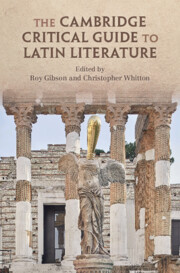Book contents
- The Cambridge Critical Guide to Latin Literature
- The Cambridge Critical Guide to Latin Literature
- Copyright page
- Dedication
- Contents
- Figures and Tables
- Contributors
- Preface
- Abbreviations
- Chapter 1 Introduction
- Chapter 2 Canons
- Chapter 3 Periodisations
- Chapter 4 Author and Identity
- Chapter 5 Intertextuality
- Chapter 6 Mediaeval Latin
- Chapter 7 Neo-Latin
- Chapter 8 Reception
- Chapter 9 National Traditions
- Chapter 10 Editing
- Chapter 11 Latin Literature and Linguistics
- Chapter 12 Latin Literature and Material Culture
- Chapter 13 Philosophy
- Chapter 14 Political Thought
- Chapter 15 Latin Literature and Roman History
- Chapter 16 Latin Literature and Greek
- Envoi
- Index Locorum
- General Index
- References
Envoi
Published online by Cambridge University Press: 04 January 2024
- The Cambridge Critical Guide to Latin Literature
- The Cambridge Critical Guide to Latin Literature
- Copyright page
- Dedication
- Contents
- Figures and Tables
- Contributors
- Preface
- Abbreviations
- Chapter 1 Introduction
- Chapter 2 Canons
- Chapter 3 Periodisations
- Chapter 4 Author and Identity
- Chapter 5 Intertextuality
- Chapter 6 Mediaeval Latin
- Chapter 7 Neo-Latin
- Chapter 8 Reception
- Chapter 9 National Traditions
- Chapter 10 Editing
- Chapter 11 Latin Literature and Linguistics
- Chapter 12 Latin Literature and Material Culture
- Chapter 13 Philosophy
- Chapter 14 Political Thought
- Chapter 15 Latin Literature and Roman History
- Chapter 16 Latin Literature and Greek
- Envoi
- Index Locorum
- General Index
- References
Summary
It is not hard to find examples of the use of Latin in nineteenth-century Cambridge to reject modernity or to mystify and police the boundaries of elite status and existing social and imperial hierarchies. But concentration on such examples obscures a history of the expression of radical ideas in Latin and of engagement with here-and-now issues. How can we incorporate such complexity into our understanding of the history of Latin studies, and avoid mistaking one side of an argument for the standard view of the elite? And how should Latin face its future or even its present? We should be brave enough to insist that the history of ‘western civilisation’ (not uniquely admirable or the only one to deserve attention) is incomprehensible without Latin.
- Type
- Chapter
- Information
- The Cambridge Critical Guide to Latin Literature , pp. 907 - 916Publisher: Cambridge University PressPrint publication year: 2024



